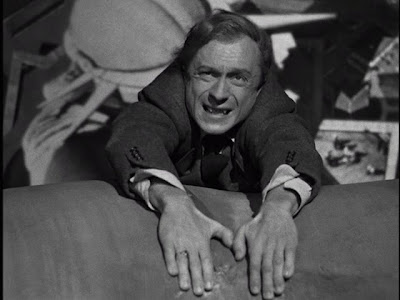
The workplace romance has become an established sub-genre of romantic comedy, so established that Morning Glory (2010) jettisons the usual question of will-the-guy-like-me-if-I'm-too-obsessed-with-work which dominated forerunners like Broadcast News. It takes place in a realistic world in which the men and women all accept that you have to be obsessed and work like a demon just to hold onto jobs in television network news. The romance is deeper and more complex in this case -- it's partly the romance of getting and keeping the job (as in the same writer's The Devil Wears Prada), but it is also the romance of obtaining the approval, and ultimately the love of a withholding and difficult substitute father-slash-mentor who has helped this woman define herself. Yes, the movie is light and funny, even laugh-out-loud funny, but the platonic romance between Rachel McAdams's young producer and Harrison Ford's disapproving anachronistic journalist sends the movie in a much more interesting journey than the usual snare-the-cute-guy chick flick.
There's a lot to like about the film. Having briefly sojourned in this field a few times I liked seeing how small, shabby and in need of paint most broadcast facilities are, how exciting walking around midtown New York can be, how obsessively people can stare at charts of numbers that are alleged to tell them important things about their jobs (this can apply to almost every field of work). I liked the mistakes they didn't make -- the heroine's boyfriend has no problem with the fact that she works hard. He's part of the same world. And they skipped having her boss (Jeff Goldblum) or Harrison Ford hit on her. Hurrah. They skipped making a fool out of Diane Keaton, the long-suffering co-anchor of the troubled broadcast. I can only recall one montage -- the obligatory show-is-becoming-a-success sequence, so that device was not overdone. Nor was there an attempt to shoehorn a song in over a falling-in-love sequence.
Two minor stumbles -- the "entertainment vs. news" argument is repeated a few too many times, especially since, as Rachel McAdams's character points out, the war is over and entertainment won. And the solution to the central problem of the story, bridging the gap between McAdams's and Ford's characters and their attitudes toward broadcasting is blindingly obvious, but nonetheless takes weeks of elapsed time and almost an hour of movie time to arrive out. On the other hand, the ultimate pay-off, the manner in which Ford reaches out to McAdams, the skill and warmth with which it is delivered and edited on film, is terrifically satisfying, and makes a possibly implausible ending plausible.
Most enjoyable of all -- the real-life director of Saturday Night Live, Don Roy King, appears as the director of Daybreak, literally conducting the broadcast like Stokowski, with a grace and graciousness that makes one appreciate how miraculous daily live television is.





No comments:
Post a Comment